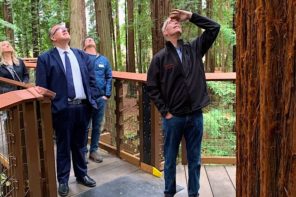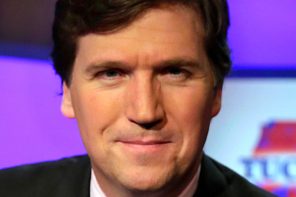“They are, of course, Nazis. They have a kind of Nazi attitude. They are the left wing of Nazism. These guys don’t want any other point of view.”
—Roger Ailes, Fox News Chairman (11/17/10 on The Daily Beast)
“Public broadcasting is a friend and protector of liberal issues and political correctness, at the expense of free speech and balanced news reporting.”
—Congressman Doug Lamborn, (R) Colorado Springs.
Colorado Springs, my hometown, leads the nation in religiosity, or so declared Men’s Health magazine recently, which ranked the “top 100” cities in terms of faith. But “religiosity” here takes on a particular meaning, one dominated by an evangelical culture increasingly tied into Tea Party ideologies and the military-industrial complex which is at the base of the local economy. It’s a powerful trifecta which will soon be in control of the House of Representatives. And it’s a combination that promises to lead an effective assault on one of the country’s most valuable venues for thoughtful civil discourse about religion: National Public Radio.
Leading the great national crusade is Representative Douglas Lamborn (R-Colorado Springs); previously unknown to the public at large but famous locally for a vigorous advocacy of military spending to a degree that makes even some Tea Partiers uneasy.
NPR and its “Liberal Agenda”
For years, Lamborn has sponsored bills to eliminate public funding for National Public Radio. The recent fortuitous combination of the Juan Williams incident and the recent elections have given his most recent efforts a very high probability of approval in the House next year, with Jim DeMint (R-South Carolina) promising to sponsor it in the Senate. Lamborn’s bill in the lame-duck Congress received unanimous Republican support, and also drew three Democratic votes. The vote calculus will change, of course, in January. The possibility of innovative programming at NPR could do so, as well.
Lamborn has justified his efforts with the usual deficit-cutting rhetoric. The fact that the money saved from defunding NPR (about $450 million) is actually less than the cost of one superfluous engine for the F-35 fighter jet—military surplus was saved from cuts despite the unanimous opposition of the Pentagon, Secretary Robert Gates, and the rest of the Colorado delegation save for Lamborn—suggests that “deficit reduction” is not the real motivation here.
The real motivation, of course, may be found elsewhere, including in Lamborn’s widely reprinted advocacy essay explaining his position:
On its own website, NPR describes itself as “an independent, self-supporting media organization… that receive[s] no direct federal funding for operations.” That carefully worded statement is disingenuous and hides the truth about the extent to which taxpayers are supporting NPR and its liberal agenda.
Lamborn has his staff hard at work untangling all those devious ways that your tax dollars support public radio (through college radio stations and the like).
The assertion about the “liberal agenda” has been belied by numerous studies. The rather predictable and mainstream bent of commentators on the flagship shows seems of more concern than the tired rhetoric of liberal bias.
But the point here isn’t to bean count partisan representatives on All Things Considered, but to look at the kinds of religious rhetoric behind attacks such as Lamborn’s. The real animus is toward projects of civil conversation in a public realm not dictated by “market forces” and corporate media.
An example comes in religion, where public radio is one of the few venues of electronic media where thoughtful and extended dialogues on matters of religious expression actually happen—quietly, routinely, and weekly.
The “Nazi” Bomb
As an example, this Sunday morning, I tuned into my local public radio station—KRCC, in Colorado Springs—and listened to a really thoughtful and intelligent program featuring a panel discussion from various locals (the religion reporter at the Colorado Springs Gazette, a college chaplain, and others) on the influence of evangelicalism in Colorado Springs. The panel discussion focused on the centrality of recruiting leaders of the religious right to the city as part of an economic revitalization program in the early 1990s; part of the story which rarely receives due attention elsewhere. The next segment gave an opportunity for a cub reporter, who visited a local mosque here in the Springs. Then the show featured a religion dispatch from the little town of Crestone, Colorado, home to a striking diversity of religious communities and utopian groups—a Carmelite monastery, a Zen Center, a sprinkling of Protestant churches, and some stupas set up in the mountains overlooking the San Luis Valley, historically considered a spiritual center by Native peoples who first inhabited the area. But ethereal spirituality, as the piece makes clear, is a challenge when you’re trying to make it through the bitter winters and swarms of spring mosquitoes in that remote corner of southwestern Colorado. Even those who practice meditation routinely have been known to throw chairs at town meetings, in a scene familiar to historians of utopian religious communities.
This was a local program, heard by very few; readers here will be more familiar with the nationally syndicated shows from Krista Tippett, Lynn Neary, and others. Weekly searching discussions of faith, religious institutions, and the interaction of religion and politics have found a home on the public radio dial more so than anyplace else in the electronic voice media.
I was thinking about the particular recent attacks on NPR further tonight in relationship to this commentary by Guy Raz at the end of Sunday’s All Things Considered. It’s a short, arresting oral essay of the kind radio does best.
Raz was reflecting on Roger Ailes, the Fox News executive who made the comments about liberal Nazis at NPR.
Leaving aside the historical malapropism of “liberal Nazis,” what moved me was Raz’s short oral essay reflecting on Ailes’ grotesque comments. Raz began by reflecting on his great-grandfather Abraham Reiss, who didn’t make it out of Europe before the real Nazis got to him. He considered further what it meant for him to hear “Nazi” used in reference to his network.
That word, Nazi, means something. We are all free to use it as we please. It’s our right, of course. But when its use is stripped of any of its real meaning, I just ask you to remember the story of Abraham Reiss.
Lamborn knows better than to drop the “Nazi” bomb into the conversation, but the “liberal bias” bunk serves the same purpose. And his staff’s investigations into the allegedly sinister doings at the network also bolster the culture wars conspiracy being peddled here. Lamborn’s likely imminent success will make it even more difficult to have civil conversations about the diverse and multiple expressions of religion in American society—especially out here in the hinterlands of Colorado.




